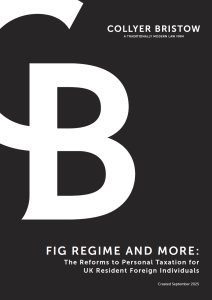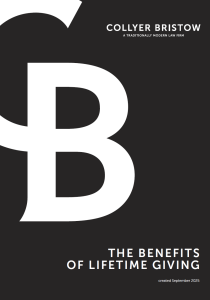
The Team
Our lawyers have the expertise and experience to provide you with creative, personalised solutions in a clear and understandable way.
Our Publications
Discover a wealth of invaluable guidance in the form of guides and brochures written by our expert lawyers.
Our insights
Discover the latest insights and thought leadership from our team of legal experts.
About
What is a family trust?
A family trust is a legal arrangement where an individual or group of individuals, known as trustees, are appointed to hold and manage assets on behalf of the trust’s beneficiaries. Trusts are typically established for the benefit of your immediate family, such as children or grandchildren, but they can also be set up more broadly to benefit friends, charities or other causes.
Why set up a family trust?
There are numerous reasons to set up a family trust. They include:
- ring-fencing assets for the benefit of future generations
- passing wealth to children or grandchildren but not until they are older
- protecting the vulnerable
How do family trusts work?
You have the choice of several family trust structures. The one you choose will depend on your individual situation and the goals you have for your estate.
The most common type of family trust is a discretionary trust. This type of trust gives trustees broad discretion about how the trust’s assets can be distributed among beneficiaries. A discretionary trust is an excellent option if you are not sure what your beneficiaries will need in the future as trustees have the flexibility to distribute funds when the need arises, such as when a beneficiary gets married or starts university. Discretionary trusts also allow the greatest flexibility to adapt to changing family circumstances.
Another option is a bare trust, where trustees manage the trust’s assets until a minor beneficiary is old enough to receive them.
You might also consider an interest in possession trust, which gives the beneficiary an income before the trust’s assets are distributed, or a mixed trust which combines elements of different types of trusts to meet your needs and situation.
Once you have established your goals, we can advise you on the most suitable type of trust. We can also provide advice on related issues such as inheritance tax planning.
How do I create a family trust?
You will need help to set up a family trust. The rules and regulations surrounding trusts and their taxation are complex and you need to ensure that everything is properly documented.
To create the trust, there will be a deed setting out the goals of the trust and who will benefit from it. You will need to list the assets that you plan to transfer into the trust and know which beneficiaries have the right to benefit from those assets and in what percentages in the future. You also need to appoint trustees who will be responsible for managing the trust. Trustees can be family members, friends or professionals such as solicitors.
What are the tax consequences of creating a family trust?
One of the main reasons for setting up a family trust is to reduce the inheritance tax liability payable on your estate when you die. The exact tax consequences will depend (amongst other things) on the type of trust that you choose to make, the amount of the loss in value to your estate and the value of the assets inside the trust.
Generally a transfer of assets to a family trust is chargeable to inheritance tax. The rate is 20% above the nil rate band available to you at the time (currently a maximum of £325,000) unless an exemption or relief applies. One of the situations where an exemption is available is when assets are placed in a bare trust as long as you survive for seven years after transferring the assets. Once the trust has been created then with the exception of a gift to a bare trust there may be exit charges when distributions are made and at each 10-year anniversary. This can be up to 6% of the trust’s value above the nil rate band .
We can advise on how to minimise taxes due on the trust’s assets when transferring them. To find out more about how we can help, please do not hesitate to contact us.
Peter DanielPartner - Head of Private Wealth
+44 20 7468 7351+44 7879 842645peter.daniel@collyerbristow.com
Caroline HollisChartered Legal Executive (FCILEx)
Explore the nuances of some of the most common aspects of UK/USA cross-border tax and estate planning.
Spotlight
Trusts for business owners
For clients who own trading businesses, trusts can be useful succession and tax planning vehicles to ensure the preservation of our clients’ wealth. For example, it may be possible to transfer shares in a business into a trust free from inheritance tax, while also optimising the capital gains tax position.
Spotlight
Trusts for future generations
Where clients wish to provide for their children and grandchildren (e.g. for the provision of school fees), it can be prudent to create a trust of up to the available inheritance tax allowance (known as the nil rate band). There will be no inheritance tax on creation and a new trust of this type can be created every seven years. Also, if clients have surplus income, outright gifts or gifts into trust out of this surplus income can be made which are completely exempt from inheritance tax.
Quick glance: publications
- FIG Regime and more: The Reforms to Personal Taxation for UK Resident Foreign IndividualsWhat the new rules mean for UK resident foreign taxpayers - What the new rules mean for UK resident foreign taxpayers
- The Benefits Of Lifetime GivingAn expert guide to tax-efficient charitable giving - An expert guide to tax-efficient charitable giving
- Lifetime Giving Handbook
- Lifetime Giving | Trusts and School FeesA guide to tax efficient arrangements - A guide to tax efficient arrangements
- Lasting powers of attorney
- How are your cryptoassets taxed?
- Decrypting a digital world
- Why might a trust be of benefit?
Family Trusts Publications
FIG Regime and more: The Reforms to Personal Taxation for UK Resident Foreign IndividualsWhat the new rules mean for UK resident foreign taxpayers - What the new rules mean for UK resident foreign taxpayers
From 6 April 2025, UK tax for foreign residents is based solely on tax residence, not domicile. The simplified system affects income, capital gains, and inheritance tax, offering some residents up to four years to shelter non-UK income and gains.
The Benefits Of Lifetime GivingAn expert guide to tax-efficient charitable giving - An expert guide to tax-efficient charitable giving
At Collyer Bristow, we help individuals, families, and trustees plan strategically to maximise the impact of their charitable giving while preserving and protecting wealth. Charitable donations, whether made during your lifetime or through your Will, can provide significant opportunities to reduce tax liabilities and create a lasting legacy.
Our latest guide, The Benefits of Lifetime Giving, explores the full range of options available and illustrates how to integrate charitable donations into a broader estate planning strategy.
Lifetime Giving Handbook
We have prepared a handbook to answer the most pressing and common lifetime giving questions and issues including; giving property to the next generation, gifts to vulnerable individuals, how best to fulfil an individual’s philanthropic ambitions, foreign gifts and the tax benefits associated with gifts of art.
Lifetime Giving | Trusts and School FeesA guide to tax efficient arrangements - A guide to tax efficient arrangements
Many families contend with paying school fees running into hundreds of thousands of pounds per child over the course of their education. This guide examines some tax efficient arrangements that other family members (typically grandparents) can use to contribute to these costs.
Lasting powers of attorney
A guide on making an LPA covering everything you need to know when considering giving another person certain authority to make decisions, in circumstances where you no longer have the mental capacity to do so on your own.
How are your cryptoassets taxed?
Guidance for individuals who hold cryptoassets, explaining what taxes they may need to pay, and what records they need to keep. Also included is information for businesses and companies about the tax treatment of cryptoasset transactions.
Decrypting a digital world
An overview of some of the key areas of interest in relation to cryptoassets, their legal treatment in the UK, and how they should be considered in tax and estate planning.
Why might a trust be of benefit?
A guide considering the many reasons and many circumstances where a trust might be of benefit.
Family Trusts insights
Shorter Reads
IHT on UK farming land and buildings held through offshore companiesIHT on UK farming land and buildings held through offshore companies
Read more
Longer Reads
Lessons from Angela Rayner’s SDLT errorsLessons from Angela Rayner’s SDLT errors
Read more
News
Farmers and business owners seek Judicial Review of Inheritance Tax Changes to Agricultural/Business Property ReliefFarmers and business owners seek Judicial Review of Inheritance Tax Changes to Agricultural/Business Property Relief
Read more
Shorter Reads
2025 Spring Statement2025 Spring Statement
Read more
Shorter Reads
‘Long Term Residence’ in the UK: Tax Consequences for International Private Clients‘Long Term Residence’ in the UK: Tax Consequences for International Private Clients
Read more
Shorter Reads
Statutory Residence TestStatutory Residence Test
Read more
Shorter Reads
UK to soften tax rules for wealthy foreigners after millionaire exodus, Rachel Reeves saysUK to soften tax rules for wealthy foreigners after millionaire exodus, Rachel Reeves says
Read more
Videos
Video | Non-Dom Tax Amendment Comments (Turkish)Video | Non-Dom Tax Amendment Comments (Turkish)
Watch now
Shorter Reads
Is the Government set to U-Turn on its Non-Dom Tax Policy?Is the Government set to U-Turn on its Non-Dom Tax Policy?
Read more
News
Collyer Bristow promotes Aidan Grant to PartnerCollyer Bristow promotes Aidan Grant to Partner
Read more
Shorter Reads
Election 2024: Initial comments on potential tax changesElection 2024: Initial comments on potential tax changes
Read more
Longer Reads
Piggy Banks to Portfolios: can children hold shares in a company?Piggy Banks to Portfolios: can children hold shares in a company?
Read more
You might also like
Need some more information? Make an enquiry below
Family Trusts key contacts
- Peter
DanielPartner - Head of Private Wealth
Talk to Peter about UK trusts, tax & estate planning, International trusts, tax & estate planning, Private wealth, Probate and US/UK Tax & estate planning
Family Trusts
Creating a lifetime trust, such as a family trust, can help ensure that your assets pass tax-efficiently to your loved ones, while protecting trust assets from assessment for residential care fees. We can help you plan ahead and preserve family wealth for the next generation.
The Team
Our lawyers have the expertise and experience to provide you with creative, personalised solutions in a clear and understandable way.
Our Publications
Discover a wealth of invaluable guidance in the form of guides and brochures written by our expert lawyers.
Our insights
Discover the latest insights and thought leadership from our team of legal experts.
What is a family trust?
A family trust is a legal arrangement where an individual or group of individuals, known as trustees, are appointed to hold and manage assets on behalf of the trust’s beneficiaries. Trusts are typically established for the benefit of your immediate family, such as children or grandchildren, but they can also be set up more broadly to benefit friends, charities or other causes.
Why set up a family trust?
There are numerous reasons to set up a family trust. They include:
- ring-fencing assets for the benefit of future generations
- passing wealth to children or grandchildren but not until they are older
- protecting the vulnerable
How do family trusts work?
You have the choice of several family trust structures. The one you choose will depend on your individual situation and the goals you have for your estate.
The most common type of family trust is a discretionary trust. This type of trust gives trustees broad discretion about how the trust’s assets can be distributed among beneficiaries. A discretionary trust is an excellent option if you are not sure what your beneficiaries will need in the future as trustees have the flexibility to distribute funds when the need arises, such as when a beneficiary gets married or starts university. Discretionary trusts also allow the greatest flexibility to adapt to changing family circumstances.
Another option is a bare trust, where trustees manage the trust’s assets until a minor beneficiary is old enough to receive them.
You might also consider an interest in possession trust, which gives the beneficiary an income before the trust’s assets are distributed, or a mixed trust which combines elements of different types of trusts to meet your needs and situation.
Once you have established your goals, we can advise you on the most suitable type of trust. We can also provide advice on related issues such as inheritance tax planning.
How do I create a family trust?
You will need help to set up a family trust. The rules and regulations surrounding trusts and their taxation are complex and you need to ensure that everything is properly documented.
To create the trust, there will be a deed setting out the goals of the trust and who will benefit from it. You will need to list the assets that you plan to transfer into the trust and know which beneficiaries have the right to benefit from those assets and in what percentages in the future. You also need to appoint trustees who will be responsible for managing the trust. Trustees can be family members, friends or professionals such as solicitors.
What are the tax consequences of creating a family trust?
One of the main reasons for setting up a family trust is to reduce the inheritance tax liability payable on your estate when you die. The exact tax consequences will depend (amongst other things) on the type of trust that you choose to make, the amount of the loss in value to your estate and the value of the assets inside the trust.
Generally a transfer of assets to a family trust is chargeable to inheritance tax. The rate is 20% above the nil rate band available to you at the time (currently a maximum of £325,000) unless an exemption or relief applies. One of the situations where an exemption is available is when assets are placed in a bare trust as long as you survive for seven years after transferring the assets. Once the trust has been created then with the exception of a gift to a bare trust there may be exit charges when distributions are made and at each 10-year anniversary. This can be up to 6% of the trust’s value above the nil rate band .
We can advise on how to minimise taxes due on the trust’s assets when transferring them. To find out more about how we can help, please do not hesitate to contact us.
Peter DanielPartner - Head of Private Wealth
View Peter Daniel's profileAidan GrantPartner
View Aidan Grant's profileCameron CreesAssociate
View Cameron Crees's profileCarly RussellPartner
View Carly Russell's profileCaroline HollisChartered Legal Executive (FCILEx)
View Caroline Hollis's profileCharlie FowlerPartner
View Charlie Fowler's profileDaniel SimonSenior Partner
View Daniel Simon's profileEmily MalvasoSenior Associate
View Emily Malvaso's profileGeorgina CraneSenior Associate
View Georgina Crane's profileHenry LopesAssociate
View Henry Lopes's profileIsobel RudgeAssociate
View Isobel Rudge's profileIzel UzunParalegal
View Izel Uzun's profileJames AustenPartner
View James Austen's profileJohn SanerPartner
View John Saner's profileKathy AllsoTrust Manager
View Kathy Allso's profileRachel PangAssociate
View Rachel Pang's profileRoger WoolfeConsultant
View Roger Woolfe's profileTulin Kiranoglu HamitPartner
View Tulin Kiranoglu Hamit's profileExplore the nuances of some of the most common aspects of UK/USA cross-border tax and estate planning.
SPOTLIGHT
Trusts for business ownersopen
For clients who own trading businesses, trusts can be useful succession and tax planning vehicles to ensure the preservation of our clients’ wealth. For example, it may be possible to transfer shares in a business into a trust free from inheritance tax, while also optimising the capital gains tax position.
Trusts for future generationsopen
Where clients wish to provide for their children and grandchildren (e.g. for the provision of school fees), it can be prudent to create a trust of up to the available inheritance tax allowance (known as the nil rate band). There will be no inheritance tax on creation and a new trust of this type can be created every seven years. Also, if clients have surplus income, outright gifts or gifts into trust out of this surplus income can be made which are completely exempt from inheritance tax.
Family Trusts Publications
- FIG Regime and more: The Reforms to Personal Taxation for UK Resident Foreign IndividualsWhat the new rules mean for UK resident foreign taxpayers - What the new rules mean for UK resident foreign taxpayers
- The Benefits Of Lifetime GivingAn expert guide to tax-efficient charitable giving - An expert guide to tax-efficient charitable giving
- Lifetime Giving Handbook
- Lifetime Giving | Trusts and School FeesA guide to tax efficient arrangements - A guide to tax efficient arrangements
- Lasting powers of attorney
- How are your cryptoassets taxed?
- Decrypting a digital world
- Why might a trust be of benefit?
Family Trusts insights
Shorter Reads
IHT on UK farming land and buildings held through offshore companiesIHT on UK farming land and buildings held through offshore companies
Read more
Longer Reads
Lessons from Angela Rayner’s SDLT errorsLessons from Angela Rayner’s SDLT errors
Read more
News
Farmers and business owners seek Judicial Review of Inheritance Tax Changes to Agricultural/Business Property ReliefFarmers and business owners seek Judicial Review of Inheritance Tax Changes to Agricultural/Business Property Relief
Read more
Shorter Reads
2025 Spring Statement2025 Spring Statement
Read more
Shorter Reads
‘Long Term Residence’ in the UK: Tax Consequences for International Private Clients‘Long Term Residence’ in the UK: Tax Consequences for International Private Clients
Read more
Shorter Reads
Statutory Residence TestStatutory Residence Test
Read more
Shorter Reads
UK to soften tax rules for wealthy foreigners after millionaire exodus, Rachel Reeves saysUK to soften tax rules for wealthy foreigners after millionaire exodus, Rachel Reeves says
Read more
Videos
Video | Non-Dom Tax Amendment Comments (Turkish)Video | Non-Dom Tax Amendment Comments (Turkish)
Watch now
Shorter Reads
Is the Government set to U-Turn on its Non-Dom Tax Policy?Is the Government set to U-Turn on its Non-Dom Tax Policy?
Read more
News
Collyer Bristow promotes Aidan Grant to PartnerCollyer Bristow promotes Aidan Grant to Partner
Read more
Shorter Reads
Election 2024: Initial comments on potential tax changesElection 2024: Initial comments on potential tax changes
Read more
Longer Reads
Piggy Banks to Portfolios: can children hold shares in a company?Piggy Banks to Portfolios: can children hold shares in a company?
Read more
Need some more information? Make an enquiry below.
Message us on WhatsApp (calling not available)
Please note that Collyer Bristow provides this service during office hours for general information and enquiries only and that no legal or other professional advice will be provided over the WhatsApp platform. Please also note that if you choose to use this platform your personal data is likely to be processed outside the UK and EEA, including in the US. Appropriate legal or other professional opinion should be taken before taking or omitting to take any action in respect of any specific problem. Collyer Bristow LLP accepts no liability for any loss or damage which may arise from reliance on information provided. All information will be deleted immediately upon completion of a conversation.
Close
































